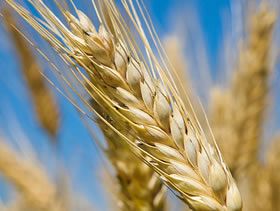 crop for MY 2014/2015 season is reported to be in good condition with an average yield of 79.5 kg/HA compared to national standard of 77 kg/HA, with very low impurity level, which optimizes its use in the mills.
crop for MY 2014/2015 season is reported to be in good condition with an average yield of 79.5 kg/HA compared to national standard of 77 kg/HA, with very low impurity level, which optimizes its use in the mills.For MY 2014/2015, the harvest is expected to be average. Although all efforts were mobilized, rainfall was late and poorly distributed in some areas of production. The forecast volume is expected to be less than last season even with the latest rainfall that gave some hope for MY 2014/2015 grain crop. Total grain area is estimated at 4.5 million HA with wheat area estimated at 3.06 million HA and barley area estimated at 1.44 million HA.
Nonetheless, the GOM has not issued its official grain production forecast for next season yet, but many analysts expect the crop to reach 7 million MT for MY 2014/15. Post estimates total cereal production to be around 7.1 million MT, with wheat and barley production around 5.4 million MT. Wheat production includes, respectively, 3.7 million MT of common and durum wheat and 1.68 million MT of barley.
Morocco’s per capita consumption of wheat, estimated at 258 kg annually, is among the highest in the world. In MY 2014/2015, total Moroccan wheat consumption is estimated at 8.3 million MT with about 34 per cent supplied by imports. As of December 2013 common wheat stocks were around 1.7 MT. Barley is consumed mostly as animal feed in Morocco with total consumption estimated at 3 million tons per year.
With pasture conditions improving this year, livestock producers have reduced their demand for feed barley. As of October 2013, Morocco’s barley reserve was estimated at about 80,000 MT. Feed barley prices trended downward in CY 2013 compared to CY 2012. Barley prices as of mid-February 2013 were estimated at 3,420 dirham per MT ($412), which is 9 per cent less than the previous year.
Post kept Morocco’s total cereal imports for MY 2013/2014 at 4.0 million MT, with 2.3 for wheat (common and durum wheat), 0.24 for barley and 1.46 for corn. Morocco’s common wheat imports have been slower than expected due to a higher domestic wheat collection rate and fluctuating wheat prices on the international market. Post estimates wheat import for MY 2014/2015 to be 3.5 million MT.
In order to protect prices in the local market, the GOM intervene from time to time to regulate the prices through custom duties. In 2013, after it was reported that wheat prices dropped by almost 40 per cent in global markets, the government decided to raise customs duties on import of common wheat from 17 to 45 per cent, in order to protect prices in the local market.
To alleviate the pressure of fluctuating international wheat prices and to ensure sufficient wheat supplies in the local market, Morocco suspended the import duty for common wheat from 1 January 2014 until 30 April 2014. In addition, the government established an import subsidy scheme for a limited time effective 1 February 2014, through which Moroccan wheat importers are reimbursed for the difference between a government set-price 2,800 dirham/MT ($337) and their actual import costs. US wheat is viewed by many Moroccan millers as an “enhancer” of flour performances, and hence some quality oriented mills have been buying it.
Morocco continued to maintain close price control of wheat and flour at all levels. Under the wheat price support scheme, producer reference price for locally grown soft wheat is set at 2,800 dirhams per ton, subsidized at 100 dirhams per ton compared to last season. A joint decision made by the Ministry of Economy and Finance and the Ministry of Agriculture and Marine Fisheries to ensure proper marketing of 2013-2014 grain harvest. Total cost for national wheat flour is 3,254 dirham/MT ($392) and its price for end-users is set at 2,000 dirham ($240)/MT. Though the GOM has kept the price of bread unchanged throughout the year, it had to do so at a huge budget cost.
In 2013, the compensation fund budget reached 42 billion dirhams ($5 billion), 23 per cent less than the budget allocated the previous year. These funds include 2.3 billion dirhams dedicated to help pay the cost difference for the National flour. For 2014, the government, in an attempt to gradually reform this fund, has only allocated 35 billion dirhams, under the Finance Act, recently passed by Parliament and approved by the Constitutional Council.
But, due to high social pressure related to inflation and purchasing power, the total liberalization of prices will not go unnoticed. 4 billion dirhams was added by end of February 2014. Given that the government still intends to provide direct subsidies to the populations in need, the reform would be progressively implemented for a three year period depending on the product’s sensitivity.
The 2014 Finance bill, however, expanded the tax base to incorporate agriculture into the system by taxing the revenues of large farms, and exempts small and medium-sized farms. The first tranche in a progressive taxation scheme started on 1 January 2014, on agricultural companies realizing a turnover equal to or in excess of 35 million dirhams ($4.2 million).
Then from 1 January 2016, farmers with a turnover equal to or above 20 million dirhams will be taxed, while the turnover threshold will be further lowered to10 million dirham in 2018, and finally to 5 million dirhams from 2020.





